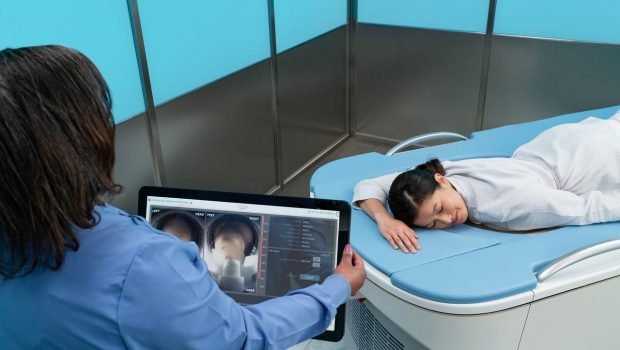New Michigan technology better detects cancer in women with dense breast tissue
Women with dense breast tissue are at greater risk of cancer, in part because there is an increased chance a suspicious mass will be missed by digital mammography.
To better address this concern, the Barbara Ann Karmanos Cancer Institute in Detroit is the first to purchase a new Michigan-developed system approved by the U.S. Food and Drug Administration to screen women who have more dense tissue than fatty tissue in their breasts, a common circumstance that complicates cancer detection.
It is a 3-dimentional whole breast ultrasound tomography system called SoftVue. For the imaging, women lay flat on their stomachs on a horizontal platform with a hole in it. Their breasts are dropped, one at a time, into a warm water bath. They are imaged using ultrasound waves and sound itself.
The device automatically collects 3D, tomographic imaging by moving a “ring of transducers” vertically from the tip of the breast, reads the FDA description.
“It’s going to be a life-saving measure,” said Dr. Natasha Robinette, a radiologist and clinical service chief of imaging at the cancer center.
“The whole thing about a screening tool, whether its digital mammography or SoftVue, is for early detection of cancer, so that woman has a fighting chance of being cancer-free after treatment.”
This system, used in conjunction with a mammogram, detects 20% more cancers than mammography alone and is 8% more specific, meaning there are fewer false positives, Robinette said.
“It’s able to detect a little bit better that there’s something there, but it’s nothing to be worried about,” Robinette said.
This means fewer patients will have to unnecessarily return to the medical center, endure a scare and worry something might be wrong.
As it now is, women with dense breasts may have to undergo, in addition to a mammogram, a breast magnetic resonance imaging (MRI), which can be expensive, and takes about an hour, or a whole-breast ultrasound. The ultrasounds are done either automatically, through mechanical compression, or manually, with a wand, as is done on the bellies of pregnant women.
Whenever a process is manual, there is a chance something can be missed, Robinette said, and the SoftVue system does not involve compression, which can be uncomfortable.
Women might not always, however, undergo the extra imaging. Patients typically receive a call or a letter and have to schedule subsequent appointments for further examination by order of a doctor.
The FDA approved SoftVue can be done at the same time as the mammogram when breasts are deemed or known to be dense, Robinette said. The test takes about 3 to 5 minutes per breast, about 10 minutes total, and it is more of a private screening option “for those who may be self conscious about body image or exposing themselves for medical procedures.” In a video demonstration, the patient always is covered, either by the machine or a gown.
“SoftVue images are intended to be interpreted with the mammogram results to enhance screening,” reads a summary published by the FDA, which found no known contraindications or safety concerns.
It streamlines the process, Robinette said, and the resulting images, which involve color, are easier for radiologists to read.
The FDA found the probable risks of the SoftVue System are in terms of diagnostic accuracy, false positives and false negatives, but the benefits outweigh the risks, the agency determined.
For 10 years, the system has been in development. Karmanos, part of Grand-Blanc based McLaren Health Care, launched Delphinus Medical Technologies in Novi and together they developed the device.
“We are excited about our next steps together to provide a new solution for the unmet needs and challenges of dense breast screening, and to share our proven clinical benefits with their patients,” Mark J. Forchette, Delphinus president and CEO, said in a statement.
Persistent supply-chain issues related to the pandemic likely will limit widespread distribution, at least for the short term, but Robinette sees implementation elsewhere. Health systems east and south of Michigan are considering SoftVue.
Though there are 16 Karmanos sites, the SoftVue system will only be at the cancer center’s main campus in Detroit, at least to start. The unit will be live by the end of the year, Robinette said, and operated by ultrasound technicians. She hopes to see it eventually offered too at Karmanos’ Farmington Hills breast care center.
The research objective was to help patients with dense breast tissue, found in about 40% of women, who are four times more likely to develop breast cancer.
On mammogram, the more granular the breast tissue, the whiter the breast appears. Suspicious masses also appear white, so they can be hidden from view.
Cancer arises not from the fat tissue, but from the granular tissue, so the more granular tissue, the increased risk of cancer, Robinette said.
At this time, experts disagree on what other tests, if any, should be done, reports the American Cancer Society.
Letters sent to women with dense breasts are not standardized. “And I think there’s always been confusion on the patient’s part about really, what does that mean that you have dense breasts? And I think confusion on how to move forward,” Robinette said.
Some women might be missed. The breast MRI, for one, is reserved for people with other risk factors , such as a close relative with breast cancer or a previous ovarian or breast cancer diagnosis.
Patients might not follow-up, or a doctor could decide further imaging unnecessary.
“That kind of leaves the woman somewhat in a limbo land, either they chose to do something additional, or they don’t so they come back in another year for their mammogram.”
Read more on MLive:
Michigan’s pandemic response ‘well coordinated’ but implementation fell short: draft report
Michigan business drops college degree job requirement — it’s not alone
Military, overseas ballots go out Saturday. More rights for these voters could follow.
Fewer COVID patients are winding up in critical care than anytime in the pandemic








Gloss